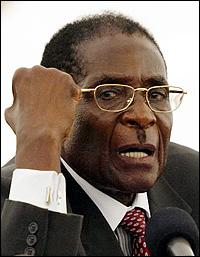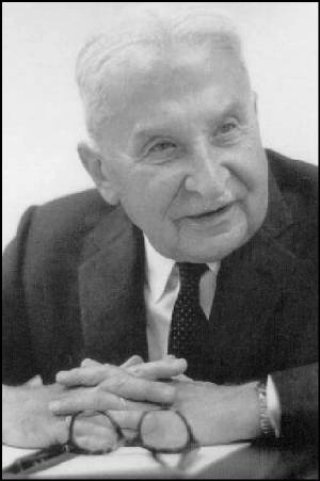
The stories keep repeating themselves, so they should come as no surprise. The world, it seems, is still governed by “cause and effect.” These New York Times articles tell the story:
“Anti-Inflation Curbs on Prices Create Havoc for Zimbabwe”
As the police and a pro-government youth militia swept into shops and factories, threatening arrest and worse unless prices were rolled back, staple foods vanished from store shelves and some merchants reported huge losses. News reports said that some shopkeepers who had refused to lower prices had been beaten by the youth militia, known as the Green Bombers for the color of their fatigues.
“Zimbabwe Bans Bulk Buying as Shops Run Empty”
Mugabe denies charges he has presided over the country’s worst economic crisis since independence from Britain in 1980 and instead says the West has sabotaged the economy to punish him for seizing white-owned commercial farms for blacks.
Note the use of “presided over” in place of “caused.”

(The economist Ludwig von Mises had important things to say on the dynamics of interventionism, much of which is being demonstrated again in the agony of the Zimbabweans.)










Tell me quickly, for I may not get to read the rest of Ludwig von Mises. Does he think the masses can be taught? Or are they doomed to following the most charismatic leader of the day?
He thought that reason can, indeed, prevail, indeed, that most of the problems of the world are due to not thinking things through.
His books are challenging, interesting, and very rewarding. (I’d add “sometimes a bit dogmatic,” as he thought that the model for truly scientific social theory was logical deduction from axioms, but that doesn’t diminish the importance of the insights that he had and shared with the rest of mankind.) If you haven’t read any Mises and you’ve got some patience and some time, you may be in for a real treat.
Oh my! As I stay up later than I should, I find you are right. Mises is both difficult and delightful. Thank you for the introduction!
Tom, YOU are being dogmatic slandering Mises like that. Everyone knows that Mises is the second greatest thinker in all of history, an eyelash behind Murray Rothbard, and that he laid the foundation for all modern thought, including ethics, geometry, and optics. Further, he’s the only economist worth reading (besides Rothbard), because he reinvented the entire field from the ground up. You ought to know better!
Yeah, Tom. Except that everyone knows that Mises is the third greatest thinker in all of history. Hans the Hoppe has demonstrated that Mises created everything and that is a greater demonstration of intellectual power than actually creating everything. So it’s Hoppe, Rothbard, and Mises. Greg is a traitor and can be refuted and shown to have contradicted himself, so he doesn’t even exist!
Tee hee!
Mr. Palmer, the contention Mises made (which another economist advanced very well) was a good one; you can’t sort out the acting variable(s) in economics, or in any truly ‘soft’ sciences. The only way to reliably interpret historical data (which includes empirical laboratory work) is to either isolate acting variables (lab experiments) or to construct a theoretical framework from the ground up, on universally valid principles, and apply it to the situation at hand. Mises, and Rothbard as well, were curious. They probably possessed a more immense knowledge of the historical data under consideration than econometricians who should, logically, have concerned themselves with nothing else, but on a theoretical level they found it (correctly I believe) to be uninteresting. It didn’t actually tell you anything you didn’t already know, and by their lights, it couldn’t.
That said, this is very horrifying and amusing at the same time. Is anyone in possession of a good brand of tyrannicide? Something like Raid? Spray-on assassination (caution: aim away from face!) perhaps?